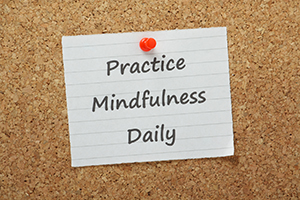Mindfulness helps some people manage ADHD

Could this be you?
“I’m sitting here trying to write this paper–or pay these bills or wash these dishes–and I’m having a tough time concentrating,” you’re thinking. “I wish there was something I could do to help me get in the right frame of mind to tackle this task.”
What if you followed that thought with, “Oh, wait, I know. I could take a moment to concentrate on my breathing, pay attention to my body, and quietly describe my environment. I could practice mindfulness.”
Mindfulness describes a state of mind when you actively pay attention to your breathing, notice how your body feels, and attempt to be present in the moment, rather than remembering what has happened or thinking about what may happen. On-going research on mindfulness has shown it can help some people with their ADHD symptoms. As a complementary approach, some health care providers are suggesting people affected by ADHD add mindfulness practices to their treatment plans.
“It’s about being less distracted and bringing our attention to aspects of the present moment,” says California psychiatrist Lidia Zylowska, MD. “It is also about having an open, nonjudgmental attitude when mindfully observing what is. Through mindfulness people with ADHD develop ‘meta-awareness,’ the ability to not only be aware of their attention, but to monitor and remember where it goes.”
Dr. Zylowska has researched the effect of mindfulness training for adults affected by ADHD. In Mindfulness and Adult ADHD for CHADD’s Attention magazine, she explains what it means to be mindful.
Dr. Zylowska says that when you employ mindfulness practices, you can help improve your attention, use self-coaching techniques to bolster your confidence, and improve your self-regulation skills. Some people may experience greater or less improvement than others who are also practicing mindfulness.
She and her colleagues have developed a training program in mindfulness for people affected by ADHD. It follows eight steps:
- Become more present.
- Focus the wandering mind: Learning mindful breathing.
- Direct and anchor your awareness.
- Listen to your body.
- Observe your mind.
- Manage your emotions.
- Communicate skillfully.
- Slow down to be more effective.
—from Mindfulness and Adult ADHD
Mark Bertin, MD, writing in Mindfulness and Managing ADHD for Attention magazine says mindfulness originates with the practice of meditation, which is practiced by many traditions from around the world.
“This style of meditation is accessible to anyone, as there’s no attempt to reach any particular mental or spiritual state of mind,” Dr. Bertin says. “We practice [mindfulness by] focusing our attention with patience, expecting that we’ll get distracted over and over again. Like training from scratch for a marathon, we start with whatever our tendencies are and work from there. On the busiest day, even in the midst of minutes or hours of scattered thinking, pausing and returning to focus on a few breaths is meditation. Meditation is a way of training our ability to focus our attention where we want, away from distracting, anxiety-provoking thoughts, and all the layers we mentally add on to situations that complicate our lives.”
Even a moment of mindfulness, where you relax and breathe deeply can help center you on accomplishing the task you have at hand, whether it’s writing your paper, paying your bills or finishing your housework.
Interested in more about mindfulness? Read Mindfulness and Adult ADHD.
